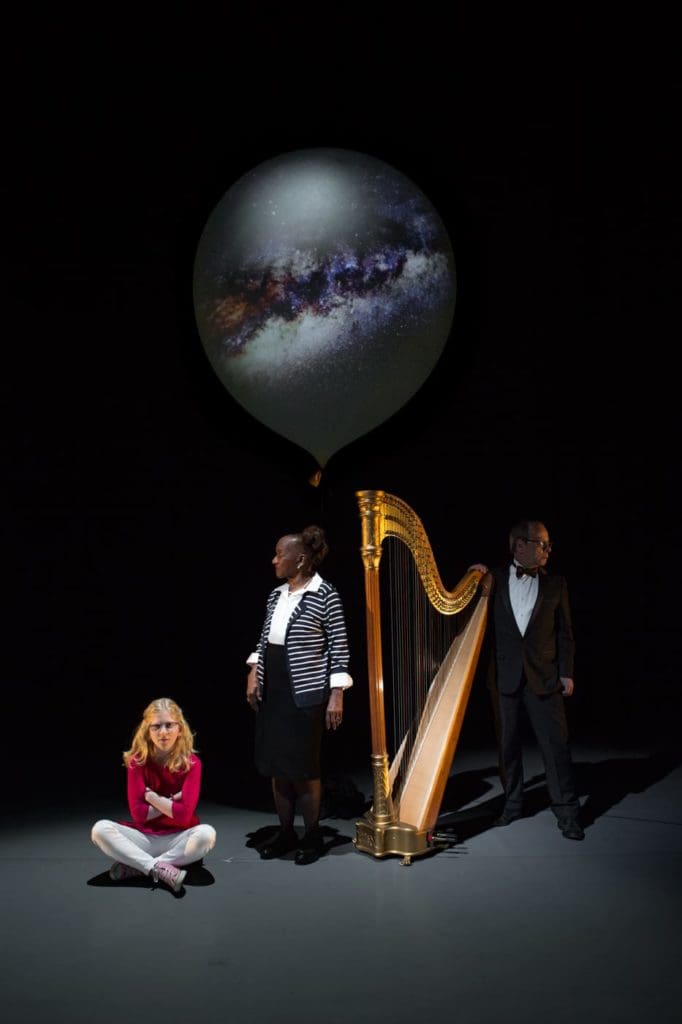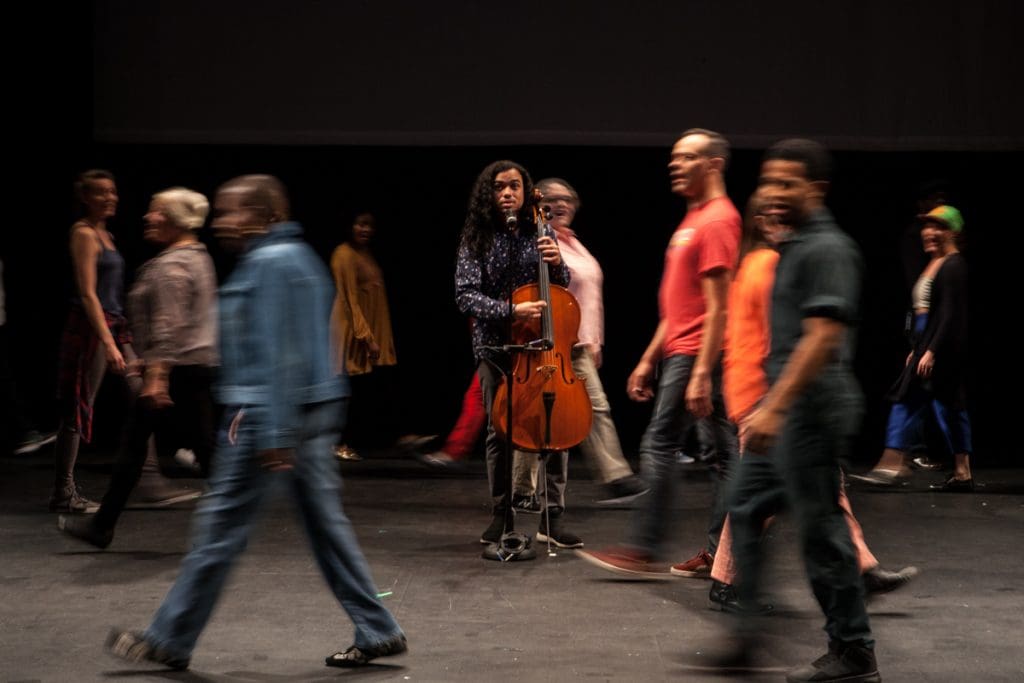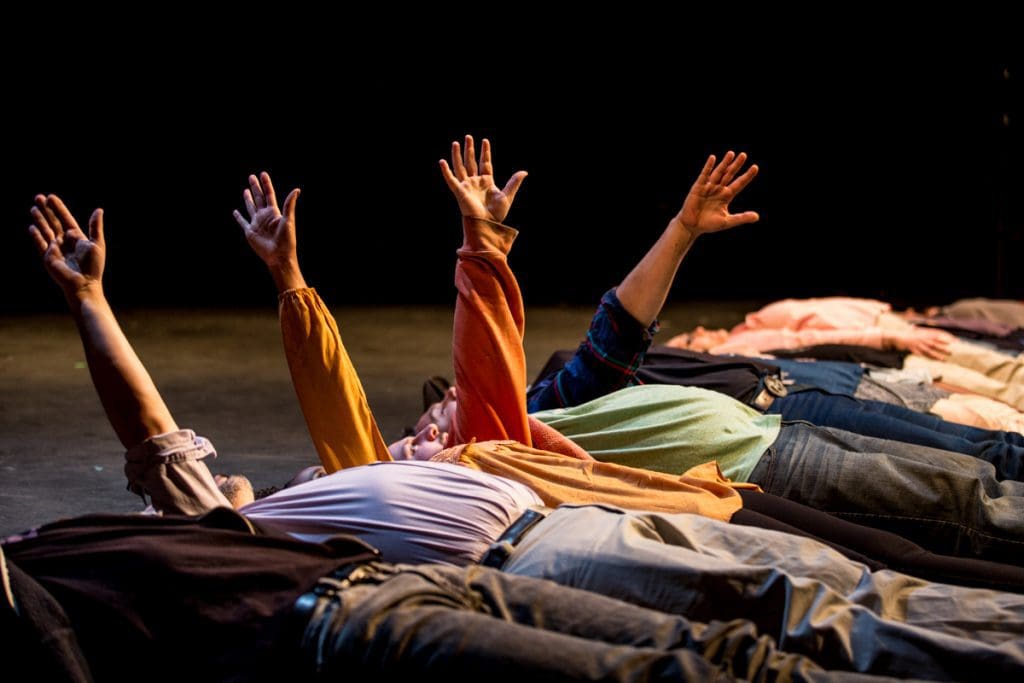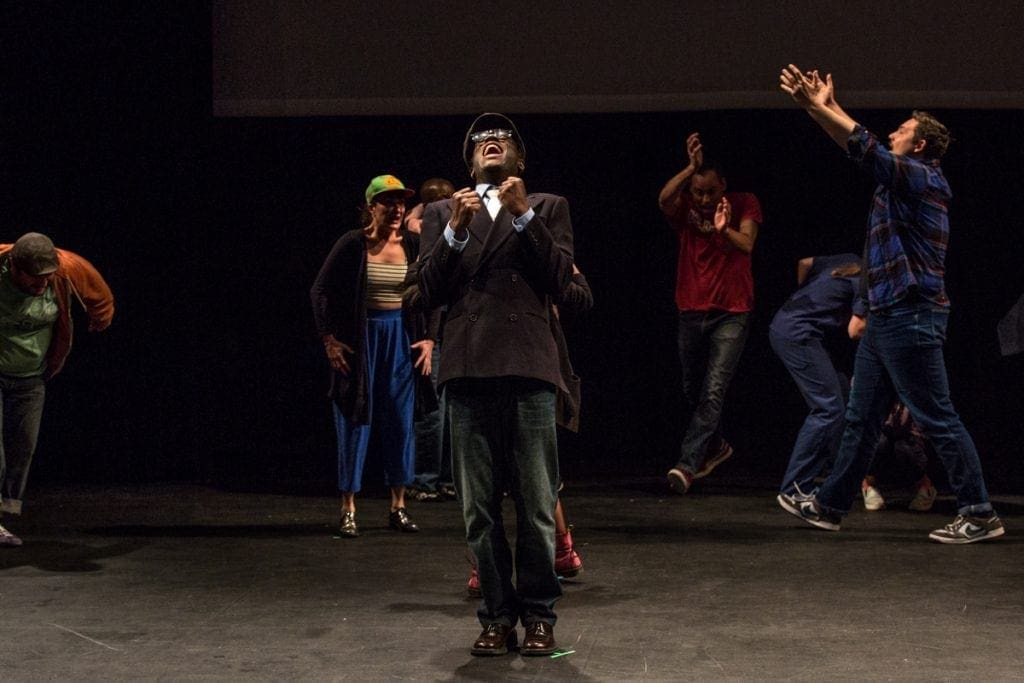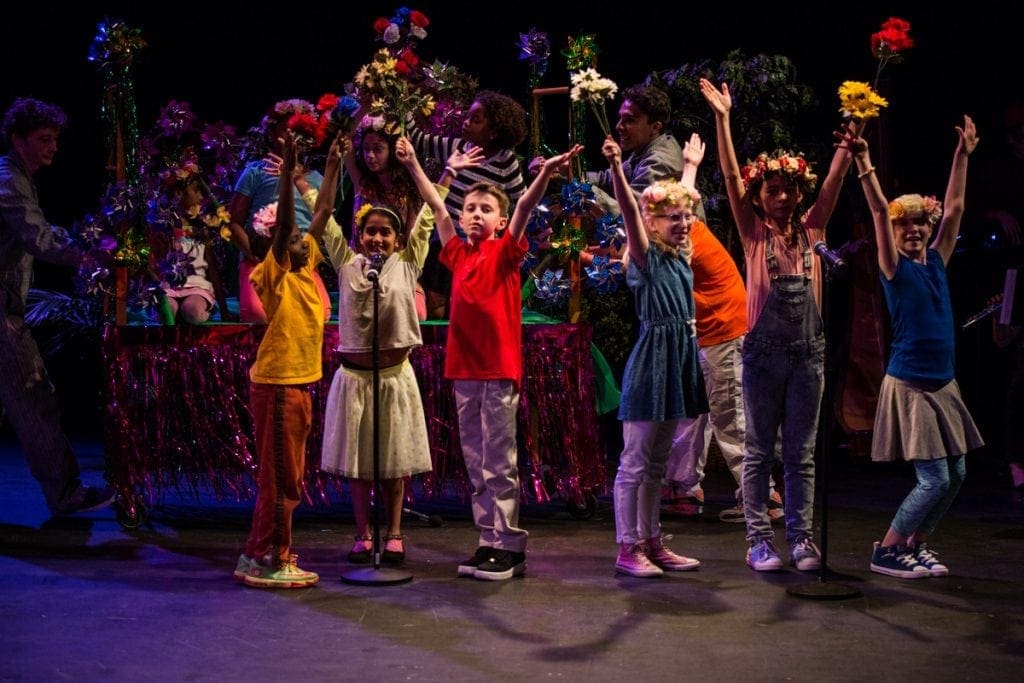A Period of Animate Existence Reading List
Next weekend the beloved Philadelphia institution Pig Iron Theatre Company returns to the Fringe Festival with their first major work in two years, and it’s clear they put that time to good use. A Period of Animate Existence may be their most ambitious work to date, an awe inspiring large-scale piece of symphonic theater that examines the most universal, urgent issue of our time: climate change.
In an era called the “Sixth Extinction,” when up to 50 percent of all living species might die off, rather than grappling with the issue in a lecturing, damning manner, the creative team hopes to achieve something more nuanced and universally relatable. “We’ve tried hard to avoid an activist voice with this piece—we want to avoid haranguing or scolding as we investigate the landscape of emotions around climate change,” director Dan Rothenberg told the FringeArts Blog. “As we contemplate extinctions, I keep talking about emotions that I don’t have a name for. I know what grief is, having experienced the deaths of people close to me. And I know what terror is. I think finding ourselves in the middle of extinction creates feelings like grief and terror, but it’s some other emotion that doesn’t have a name.” In taking this lofty approach to the issue, the artists have most certainly done their homework, and then some.
The company has been gracious enough to share with us a list of texts that helped inform the piece. These works may help deepen audiences’ understanding of the show, but, perhaps more importantly, they will help deepen their understanding of the serious crisis we are currently living with. If confronting this harrowing information sounds daunting or terrifying or a surefire way to send yourself into fear-induced catatonia, believe me, I understand. Yet, in reading from these works, I’ve found being informed in my dread has been far more comforting than being ignorant in it. And thankfully, despite the dire nature of the situation, many of these writers chart concrete courses of action for how we might curb the most catastrophic effects of climate change.
Taking in this full picture, perhaps you’ll find yourself not quite feeling grief, not quite feeling terror, but feeling that liminal emotion A Period of Animate Existence strives to articulate.
Vibrant Matter
Jane Bennett
Renowned political theorist Jane Bennet—known for her focus on nature, ethics, and affect— examines the active participation of nonhuman forces in natural events. Exploring just how political analyses of public events might change were we to acknowledge that agency is not strictly human, she suggests that such a change in perspective might provide impetus for more responsible, ecologically sound politics.
Key Writings
Henri Bergson
French philosopher Henri Bergson was an influential thinker of the early 20th century, one who recognized his time as a distinctly new and modern age, and in turn helped shape its intellectual discourse. At the core of his philosophy is his concept of Duration, a theory of time and consciousness, but most pertinent to the show is his concept of élan vital, his explanation for evolution (a relatively new concept at the time) and the development of organisms which essentializes life into “mobility itself.” This collection assembles Bergson’s most essential writings, including excerpts from Creative Evolution.
The Great Derangement: Climate Change and the Unthinkable
Amitav Ghosh
Acclaimed Indian novelist Amitav Ghosh takes to task our inability to grasp the scale and violence of climate change, particularly in terms of what he sees as an imaginative failure of literary writers. Arguing that the extreme nature of climate events make them resistant to contemporary modes of thinking and imagining, he sees this as connected to the fact that politics and literature have become matters of personal moral reckoning rather than a platform for collective action. They are therefore, at the moment, unequipped to deal with what is truly the greatest threat humanity has ever faced. It’s not all doom and gloom though, as Ghosh sees the climate crisis as an opportunity for us to imagine other forms of human existence. He sees no better realm to address this task than in the world of fiction.
Sapiens: A Brief History of Humankind
Yuval Noah Harari
Examining homo sapiens from their first appearance to their ongoing reign as rulers of the world, historian Yuval Noah Harari breezily lays out some 150,000 years of human history. Touching on the invention of money (“the most pluralistic system of mutual trust ever devised”), capitalism (“the most successful religion ever invented”), modern agriculture and its treatment of animals (“probably the worst crime in history”), and much more, Harari gives readers a crash course in where we’ve been and posits where we might be going. Among the books most powerful insights is the assertion that, despite the fact that we may be more powerful and comfortable than our ancient ancestors, we aren’t much happier.
Homo Deus
Yuval Noah Harari
Picking up where the acclaimed Sapiens left off (the present), Harari turns his attention to where our species may be headed. Equipped with godlike technologies we are now more poised than ever to turn the old myths of humanity into reality. Harari speculates on our future by examining a variety of burgeoning issues including information gathering, increased automation, genetic engineering, technology as religion, and much more.
The Case for a Carbon Tax: Getting Past Our Hang-Ups to Effective Climate Policy
Dr. Shi-Ling Hsu, PhD, JD
Environmental law professor Dr. Shi-Ling Hsu presents an illuminating analysis of current climate change policy (though it was published in 2011). In doing so he demonstrates why a carbon tax would be the most effective policy towards curbing CO2 emissions. Though not perfect, he asserts it is the best course we currently have charted. He also parses through the social and political factors preventing governments and politicians from enacting this approach.
Reason in a Dark Time: Why the Struggle Against Climate Change Failed – and What It Means for Our Future
Dale Jamieson
A sobering interrogation of where we go from here from Dale Jamieson, a professor of Environmental Studies, Philosophy, and Law at NYU. Jamieson explains how we have failed to stop climate change, exposing our current inability to grapple with the issue politically and cognitively. Climate change threatens our sense of meaning, as it is difficult to believe one’s actions are at all important or effective when staring down extinction, but Jamieson strives to present how we might adapt to our circumstance and restore agency and meaning to our lives.
The Sixth Extinction: An Unnatural History
Elizabeth Kolbert
Journalist Elizabeth Kolbert’s Pulitzer Prize-winning book lays out the concept and history of mass extinctions, but focuses largely on the titular one for which we as a species are to blame. Consulting the work of a great many researchers in various fields—including geology, botany, marine biologists, and more—and introducing readers to a dozen species that have recently gone extinct or are on the verge of it, she reveals the slow burn of this mass extinction, an event she believes is likely to be mankind’s most lasting legacy.
The Earth and I
James Lovelock, Editor
Conceived by scientist, environmentalist, and futurist James Lovelock, inventor of the Gaia theory, this illustrated essay collection brings together an all-star lineup of thinkers and scientists—including quantum physicists, astronomers, biologists, and neuroscientists—to offer essential understanding about who we are, how we live, and where we might be going. Taking into consideration the structures of our species and our planet, our cells and our ecosystems, contributors look at a variety of issues that connect to our relationship with the Earth, and in turn climate change. The book includes lush, eye-popping illustrations from British artist Jack Hudson.
Dark Ecology: For a Logic of Future Coexistence
Timothy Morton
Asserting that the logistics of agricultural society have allowed us to separate ourselves from our conception of nature, writer and academic Timothy Morton explores the logical foundations of our ecological crisis in this accessible, playful, and even at times comedic work. Incorporating theories and findings of philosophy, anthropology, literature, ecology, biology, and physics, Morton offers some hope that our species might reestablish a more symbiotic relationship with our planet’s nonhuman beings. For further reading on the subject, check out Morton’s blog which he updates regularly.
Seven Brief Lessons on Physics
Carlo Rovelli
A crash course in modern physics from a renowned theoretical physicist, this entertaining and enlightening book briskly tackles Einstein’s general relativity, quantum mechanics, elementary particles, gravity, black holes, the complex architecture of the universe, and how humans fit into it all in a manner accessible to those who might find the very thought of such concepts intimidating.
Learning to Die in the Anthropocene: Reflections on the End of a Civilization
Roy Scranton
Combining memoir, reportage, and philosophy, journalist and Iraq War veteran Roy Scranton makes the compelling argument that in order to truly deal with and address climate change we must better come to terms with our own mortality. Expanding on his lauded essay for the New York Times Scranton asserts that our acceptance of this inevitability must go beyond simply facing our own demise to the demise of civilizations itself.
The Book on the Taboo Against Knowing Who You Are
Alan Watts
British writer and philosopher Alan Watts was, for much of his career, the Western world’s most popular interpreter and proponent of Eastern philosophies. One of his later works, The Book posits that all human conflict stems from our fundamental misunderstanding of who we are. Watts exposes how our increased investment in the idea of the individual fuels humanity’s most misguided and hostile behaviors, and seeks to help us understand how the self connects to the greater whole of the universe.
The Diversity of Life
Edward O. Wilson
Pulitzer Prize winning author and world renowned biologist Edward O. Wilson explores how the living world became diverse and how humans are destroying that diversity. Tracing evolutionary processes, he delves into the mass extinctions of the past and what it took for the planet to repair its biodiversity in their wake. In examining our current crisis, he has little optimism for the possibility of repair if we continue to destructively barrel into the future, but in turn presents a compelling argument that the preservation of nature and economic development can and should no longer be treated as mutually exclusive goals.
Half-Earth: Our Planet’s Fight for Life
Edward O. Wilson
Described as a “visionary blueprint for saving the planet,” Wilson’s latest work argues that the current mass extinction has increased in magnitude to the point that we can no longer stem it with targeted initiatives that address only a small number of the innumerable threats the issue presents. Instead, he proposes dedicating half of the Earth’s surface to nature, even pointing to specific regions where this may actually be possible.
—Hugh Wilikofsky
All photos by Maria Baranova.
A Period of Animate Existence
Pig Iron Theatre Company
Sept 22 at 8pm
Sept 23 at 2pm + 8pm
Sept 24 at 2pm + 7pm
Annenberg Center for the Performing Arts, Zellerbach Theater
3680 Walnut Street
Wheelchair accessible
$39–$49 (general)
$27.30–$34.30 (member)
$15 (student + 25-and-under)
TICKETS + INFO

